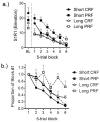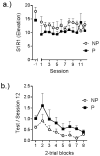Factors that influence the persistence and relapse of discriminated behavior chains
- PMID: 28449946
- PMCID: PMC5499247
- DOI: 10.1016/j.beproc.2017.04.009
Factors that influence the persistence and relapse of discriminated behavior chains
Abstract
Behavior chains are composed of sequences of behaviors that minimally include procurement and then consumption. This review surveys recent research from this laboratory that has examined the properties of discriminated heterogeneous behavior chains. In contrast to another review (Thrailkill and Bouton, 2016a), it discusses work examining what makes chained behavior persistent, and what makes it relapse. Results suggest that responses in a discriminated heterogeneous behavior chain may become associated, so that extinction of either one reduces the strength of the other. Evidence also suggests that the goal of the first (procurement) response may be the next (consumption) response (rather than the upcoming discriminative stimulus, a putative conditioned reinforcer, or the primary reinforcer at the end of the chain). Further studies suggest that methods that promote generalization across acquisition and extinction (partial reinforcement and delivery of noncontingent reinforcers during extinction) lead to greater persistence of the procurement response. A third set of studies analyzed the contextual control and relapse of chained behaviors. The context controls both the acquisition and extinction of chained behaviors. In addition, a separately-extinguished consumption response is renewed when returned to the context of the chain. The research expands our general understanding of the learning processes that govern instrumental behavior as well as our understanding of chains.
Keywords: Context; Discriminated operant; Extinction; Heterogeneous chains; Persistence; Relapse.
Published by Elsevier B.V.
Figures






References
-
- Adams CD. Variations in the sensitivity of instrumental responding to reinforcer devaluation. The Quarterly Journal of Experimental Psychology B: Comparative and Physiological Psychology. 1982;34:77–98.
-
- Amsel A. Partial reinforcement effects on vigor and persistence: advances in frustration theory derived from a variety of within-subjects experiments. In: Spence KW, Spence JT, editors. The Psychology of Learning and Motivation. Vol. 1. New York NY: Academic Press; 1967. pp. 1–65.
-
- Baker AG. Contextual conditioning during free operant extinction: Unsignaled, signaled: and backward-signaled noncontingent food. Animal Learning & Behavior. 1990;18:59–70.
-
- Balleine BW, Garner C, Gonzalez F, Dickinson A. Motivational control of heterogeneous instrumental chains. Journal of Experimental Psychology: Animal Behavior Processes. 1995;21:203–217.
Publication types
MeSH terms
Grants and funding
LinkOut - more resources
Full Text Sources
Other Literature Sources

